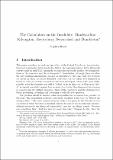Files in this item
The calculators on the insolubles : Bradwardine, Kilvington, Heytesbury, Swyneshed and Dumbleton
Item metadata
| dc.contributor.author | Read, Stephen | |
| dc.contributor.editor | Di Liscia, Daniel A. | |
| dc.contributor.editor | Sylla, Edith D. | |
| dc.date.accessioned | 2022-06-17T11:30:08Z | |
| dc.date.available | 2022-06-17T11:30:08Z | |
| dc.date.issued | 2022-06-02 | |
| dc.identifier | 260274885 | |
| dc.identifier | a1d4cff4-414a-41ad-890d-593a2a53d705 | |
| dc.identifier.citation | Read , S 2022 , The calculators on the insolubles : Bradwardine, Kilvington, Heytesbury, Swyneshed and Dumbleton . in D A Di Liscia & E D Sylla (eds) , Quantifying Aristotle : the impact, spread and decline of the Calculatores tradition . Medieval and early modern philosophy and science , vol. 34 , Brill , Leiden , pp. 126-152 . https://doi.org/10.1163/9789004512054_007 | en |
| dc.identifier.isbn | 9789004499829 | |
| dc.identifier.isbn | 9789004512054 | |
| dc.identifier.issn | 2468-6808 | |
| dc.identifier.other | ORCID: /0000-0003-2181-2609/work/114335968 | |
| dc.identifier.uri | https://hdl.handle.net/10023/25544 | |
| dc.description | Funding: The present work was funded by Leverhulme Trust Research Project Grant RPG-2016-333: “Theories of Paradox in Fourteenth-Century Logic: Edition and Translation of Key Texts”. | en |
| dc.description.abstract | The most exciting and innovative period in the discussion of the insolubles (i.e., logical paradoxes) before the twentieth century occurred in the second quarter of the fourteenth in Oxford, and at its heart were many of the Calculators. It was prompted by Thomas Bradwardine's iconoclastic ideas about the insolubles in the early 1320s. Framed largely within the context of the theory of (logical) obligations, it was continued by Richard Kilvington, Roger Swyneshed, William Heytesbury and John Dumbleton, each responding in different ways to Bradwardine's analysis, particularly his idea that propositions had additional hidden and implicit meanings. Kilvington identified an equivocation in what was said; Swyneshed preferred to modify the account of truth rather than signification; Heytesbury exploited the respondent's role in obligational dialogues to avoid Bradwardine's tendentious closure postulate on signification; and Dumbleton relied on other constraints on signification to give new life to two long-standing accounts of insolubles that Bradwardine had summarily dismissed. The present paper focusses on the central thesis of each thinker's response to the insolubles and their interaction. | |
| dc.format.extent | 27 | |
| dc.format.extent | 243224 | |
| dc.language.iso | eng | |
| dc.publisher | Brill | |
| dc.relation.ispartof | Quantifying Aristotle | en |
| dc.relation.ispartofseries | Medieval and early modern philosophy and science | en |
| dc.subject | Signification | en |
| dc.subject | Liar paradox | en |
| dc.subject | Insolubles | en |
| dc.subject | Truth | en |
| dc.subject | Dumbleton | en |
| dc.subject | Heytesbury | en |
| dc.subject | Kilvington | en |
| dc.subject | Paul of Venice | en |
| dc.subject | Swyneshed | en |
| dc.subject | B Philosophy (General) | en |
| dc.subject | MCC | en |
| dc.subject.lcc | B1 | en |
| dc.title | The calculators on the insolubles : Bradwardine, Kilvington, Heytesbury, Swyneshed and Dumbleton | en |
| dc.type | Book item | en |
| dc.contributor.sponsor | The Leverhulme Trust | en |
| dc.contributor.institution | University of St Andrews. Arché Philosophical Research Centre for Logic, Language, Metaphysics and Epistemology | en |
| dc.contributor.institution | University of St Andrews. St Andrews Institute of Medieval Studies | en |
| dc.contributor.institution | University of St Andrews. Philosophy | en |
| dc.identifier.doi | 10.1163/9789004512054_007 | |
| dc.identifier.url | https://doi.org/10.1163/9789004512054 | en |
| dc.identifier.url | https://discover.libraryhub.jisc.ac.uk/search?isn=9789004499829&rn=1 | en |
| dc.identifier.grantnumber | RPG-2016-333 | en |
This item appears in the following Collection(s)
Items in the St Andrews Research Repository are protected by copyright, with all rights reserved, unless otherwise indicated.

